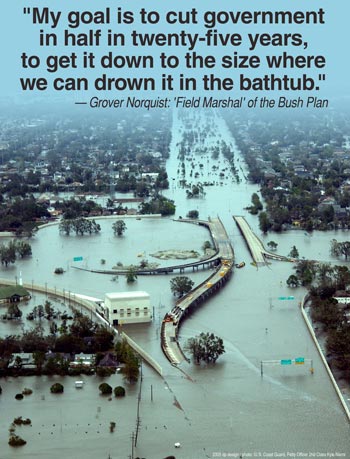NAOMI KLEIN ANALYZES NEW ORLEANS
AS PART OF "DISASTER CAPITALISM"
From Democracy Now!, author and economist Naomi Klein looks at the New Orleans debacle in terms of her new book The Shock Doctrine: The Rise of Disaster Capitalism:
Well, New Orleans is a classic example of what I’m calling the shock doctrine or disaster capitalism, because you had that first shock, which was the drowning of the city. And as you know, having just returning from New Orleans, it was not -- this was not a natural disaster. And the great irony here is that it really was a disaster of this very ideology that we’re talking about, the systematic neglect of the public sphere.
And I think, increasingly, we’re going to see this, where you have twenty-five years of steady neglect of the public infrastructure, and the bones of the state -- the transportation system, the roads, the levees -- are weak and frail. And the American Society of Civil Engineers has estimated that it would take $1.5 trillion to bring the bones of the state up to standard, because they’re so weakened, the bridges and the roads and the levees.
And
So you -- first the ideology weakens, creates the disaster, and then it’s used as an excuse to finish the job, to privatize everything, and that is what happened in New Orleans. Immediately after the city flooded, you had this ideological campaign, ground zero of which was the Heritage Foundation in Washington, which has always been, I guess, the most powerful engine for this radical free-market vision, announcing that, you know, this is a tragedy, but it’s also an opportunity to completely remake the state, i.e. eliminate it, so an explosion of charter schools -- the public schools were not reopened. They were converted to charter schools. The public hospital, like Charity Hospital, remains boarded up. The public housing --and this is the most dramatic example -- that horrible quote from a Republican congressperson: “We couldn't clean out the housing projects, but God did it” ten days after the levees broke. This is what I mean by the shock doctrine, this idea of harnessing a disaster to push through radical privatization.
Click here to read, watch, or listen to the rest.
This is only a brief moment of an interview looking at "free market" ideology, and its deadly consequences, from its birth to the present day. Here's the short version. Radical pro-capitalist reformers gain political power and then use their new ability to force enormous disasters; they then use these disasters as an excuse to ram their crackpot economic theories down people's throats. The ensuing chaos in the wake of these manufactured crises makes affected populations both dazed and compliant.
New Orleans is but one example. Another example is the CIA engineered Chilean coup, which ominously took place on September 11th, 1973. Chile's democratically elected president had enacted some very mild economic reforms which Nixon and Kissinger branded as communist, justifying covert intervention. In the wake of this disaster, the coup itself, the US had their boy, dictator Augusto Pinochet, impose radical capitalism on the population. Thousands of tortured and murdered political opponents later, Pinochet had to abandon these "free market" reforms because they had been a total failure in terms of the domestic economy.
In terms of global capitalism, however, Chile was a roaring success, transferring the nation's wealth to outside investors.
Another example of disaster capitalism is our own 9/11: US foreign policy in the Middle East, strongly influenced by the economics of oil, radicalized numerous Muslims, who eventually brought down the World Trade Center. The aftermath galvanized GOP power, and the Republican dominated Congress and White House proceeded to transmute their newly won national security clout into "free market" reform. The rest is, as they say, history.
Go check out this interview; I'm not entirely sure I agree with everything Klein says, but I think she's essentially correct and the whole thing is totally fascinating.
New Orleans during the flood.
$$$$$$$$$$$$$$$$$$$$$$$$$$$$$$$$$$$$$$$$$$
Wednesday, September 19, 2007
Posted by Ron at 12:55 AM
Subscribe to:
Comment Feed (RSS)
















|